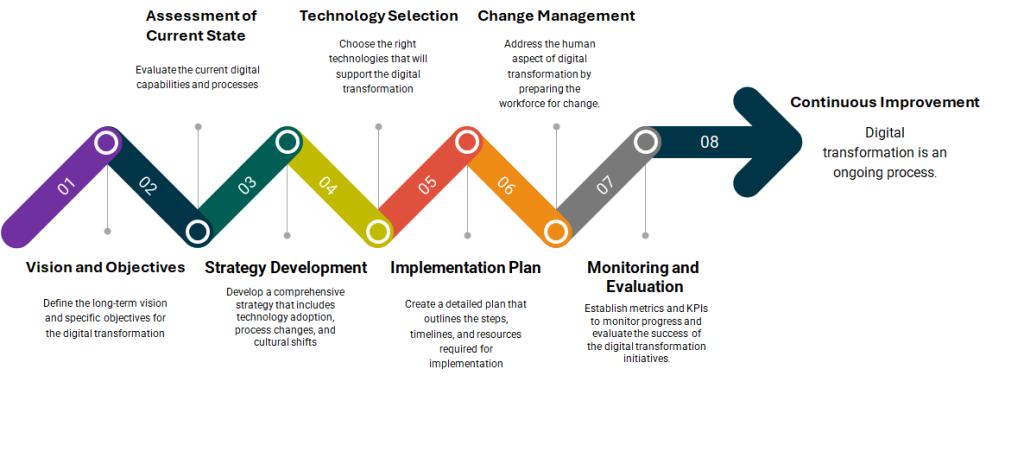Digital Transformation Service

(1) Enhanced Customer Experience
- Personalization: Digital tools enable companies to offer personalized experiences to customers, improving satisfaction and loyalty.
- Convenience: Online platforms and mobile apps make it easier for customers to interact with businesses anytime, anywhere.
(2) Increased Operational Efficiency
- Automation: Automating routine tasks reduces errors and frees up employees to focus on more strategic activities.
- Streamlined Processes: Digital technologies can optimize workflows, reducing time and costs associated with manual processes.
(3) Data-Driven Decision Making
- Analytics: Advanced analytics tools help companies make informed decisions based on real-time data.
- Insights: Data insights can identify trends, predict customer behavior, and uncover new business opportunities.
(4) Competitive Advantage
- Innovation: Embracing digital transformation allows companies to innovate and stay ahead of competitors.
- Agility: Digital tools enable businesses to quickly adapt to market changes and customer demands.

(5) Improved Collaboration
- Communication Tools: Digital platforms facilitate better communication and collaboration among employees, regardless of location.
- Remote Work: Technologies like cloud computing support remote work, making it easier to attract and retain talent.
(6) Cost Savings
- Efficiency Gains: Streamlined processes and automation lead to significant cost reductions.
- Resource Optimization: Digital tools help optimize resource allocation, reducing waste and improving productivity.
(7) Enhanced Security
- Cybersecurity: Implementing advanced security measures protects sensitive data and reduces the risk of cyber threats.
- Compliance: Digital transformation helps companies comply with industry regulations and standards.
(8) Scalability
- Growth: Digital solutions can easily scale to accommodate business growth, ensuring that systems and processes can handle increased demand.
- Flexibility: Cloud-based solutions provide the flexibility to scale resources up or down as needed.
(9) Sustainability
- Eco-Friendly Practices: Digital transformation can lead to more sustainable business practices, such as reducing paper usage and optimizing energy consumption.
- Corporate Responsibility: Companies can leverage digital tools to enhance their corporate social responsibility initiatives.
(10) Employee Empowerment
- Skill Development: Digital transformation often involves upskilling employees, making them more valuable and engaged.
- Innovation Culture: Encouraging a culture of innovation and continuous improvement can lead to higher employee satisfaction and retention.
Transformation Roadmap

